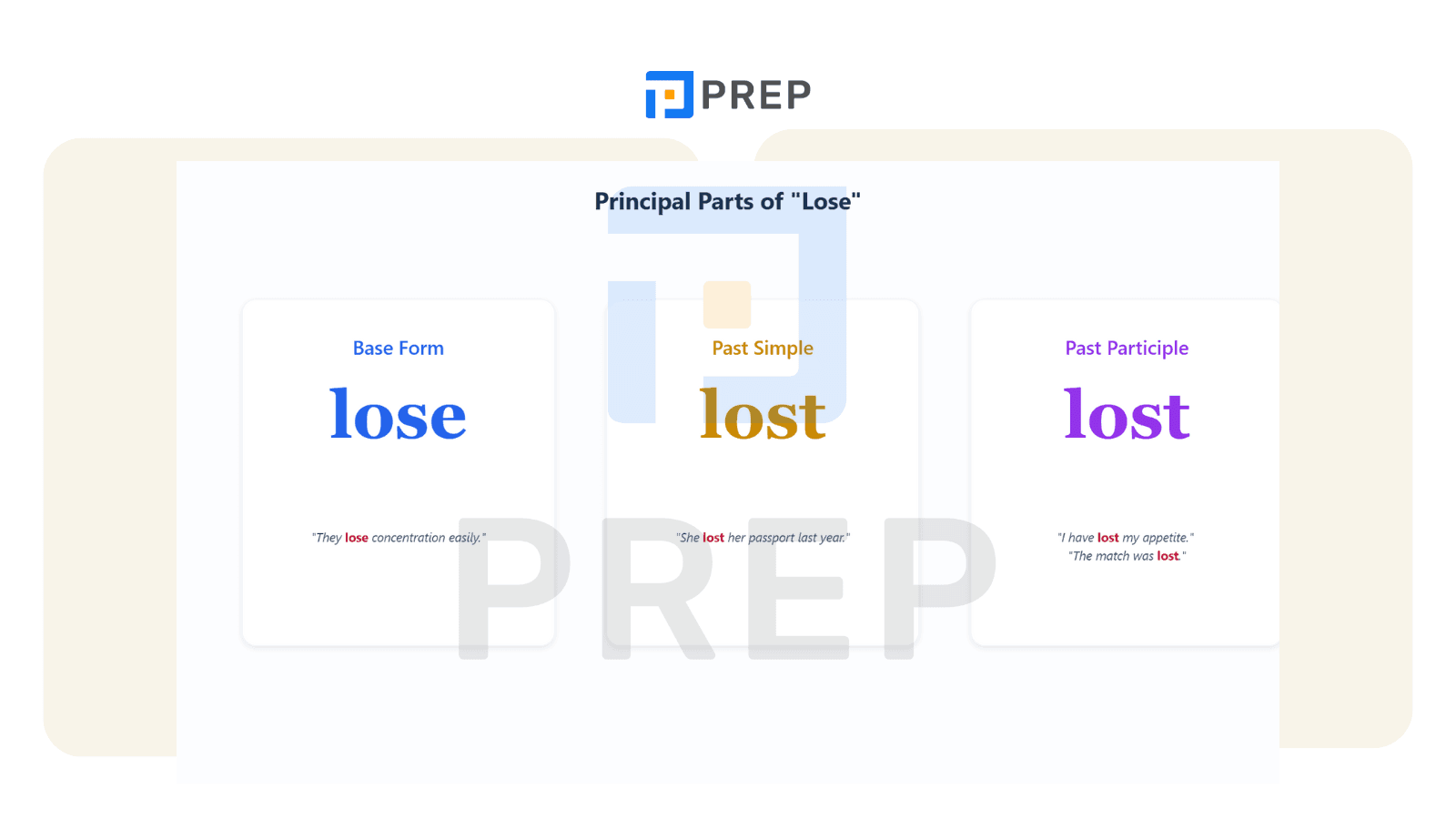Mastering 'Lost': The Definitive Guide to the Past Tense of Lose (Usage & Common Errors)
This content provides a comprehensive examination of the past tense of lose, clarifying that "lost" is the only correct past form while addressing common grammatical errors and confusions. The article systematically explains the irregular verb pattern, demonstrates proper usage in various grammatical contexts, distinguishes between the commonly confused terms "lose," "lost," and "loose," and explores both literal and metaphorical applications of "lost" in English expression. Through clear explanations, comparative tables, practice exercises, and memory techniques, the content serves as a definitive educational resource for English learners seeking to master this frequently misused verb form.
- 1. What is the past tense of the verb 'Lose'?
- 2. Understanding "Lose" as an Irregular Verb
- 3. How to use "Lost" correctly
- 4. Avoiding the grammar trap: "Lost" (from Lose) vs. "Loose" (Adjective)
- 5. Exercises for checking your understanding
- 6. Frequently asked questions about "Lost"
- 6.1. What exactly does the idiom "lost for words" mean?
- 6.2. How is being physically "lost" different from feeling emotionally "lost"?
- 6.3. Besides objects or direction, what other abstract things can be considered 'lost' in English?
- 6.4. Is it always negative to be "lost" (e.g., "lost in thought" or "lost in a good book")?
- 7. Your key takeaways for using "Lost"

1. What is the past tense of the verb 'Lose'?
The simple past tense of lose is lost. This form describes actions completed at a specific time in the past, with no connection to the present.
"Yesterday, I lost my keys while hiking through the park."
The form remains consistent regardless of the subject, applying equally to I, you, he, she, it, we, or they.
Note: "Losed" does not exist in standard English. This common error stems from attempting to apply regular verb patterns to an irregular verb. No matter the context, "losed" should never appear in your writing or speech. The only correct past tense of lose is lost—no exceptions exist.
2. Understanding "Lose" as an Irregular Verb
2.1. The principal parts: Lose – Lost – Lost
English verbs follow patterns based on their principal parts. For "lose," these critical forms are:
-
Base Form (Infinitive): lose – This form appears in present tense with I/you/we/they (They lose concentration easily), after 'to' (I don't want to lose the receipt), and in commands.
-
Past Simple: lost – This form indicates completed actions in the past (She lost her passport during the vacation).
-
Past Participle: lost – This form combines with auxiliary verbs in perfect tenses (I have lost my appetite) and passive voice (The match was lost before halftime).
2.2. Why it's irregular: no simple "-ed" ending
Regular verbs form their past tense of lose by adding -ed to the base (walk → walked, talk → talked). Irregular verbs like "lose" deviate from this predictable pattern, instead undergoing internal vowel changes or other transformations. Rather than becoming "losed," it transforms into "lost." This irregularity requires memorization rather than formula application, which presents one of the genuine challenges of English verb mastery.

3. How to use "Lost" correctly
3.1. Using "Lost" in the Simple Past Tense
The simple past tense describes actions that began and ended at a specific time in the past. Here's how "lost" functions in various common contexts:
3.1.1. Describing misplaced items
"The travelers lost their passports during the hectic airport transfer, causing significant delays to their journey."
3.1.2. Talking about failing to win
"Our team lost the championship game by a single point after leading for most of the match."
3.1.3. Indicating disorientation
"The hikers lost their way in the dense forest as darkness fell unexpectedly early."

3.2. Using "Lost" as a Past Participle
The past participle "lost" combines with auxiliary verbs to form perfect tenses and passive structures, offering more complex ways to express past actions.
3.2.1. In Present Perfect
"I have lost count of how many times we've discussed this issue without reaching a conclusion."
3.2.2. In Past Perfect
"By the time the rescue team arrived, they had lost precious hours searching in the wrong location."
3.2.3. In Passive Voice
"The historical documents were lost during the museum fire, representing an irreplaceable cultural tragedy."
3.2.4. As an Adjective
"The lost civilization remained hidden beneath the jungle canopy for centuries before archaeologists discovered its ruins."
Here, "lost" functions as an adjective describing the civilization's state rather than as a verb form.

4. Avoiding the grammar trap: "Lost" (from Lose) vs. "Loose" (Adjective)
This section addresses the most widespread confusion surrounding "lost"—the persistent mix-up with "loose," a completely different word with distinct meaning and usage.
4.1. Defining "Lose" (Verb): Meaning & Pronunciation (/luːz/)
"Lose" functions exclusively as a verb meaning to be deprived of, to misplace, to fail to win, or to become unable to find. Its pronunciation features a voiced "z" sound at the end (/luːz/).
"Your concentration will likely lose intensity after studying for more than two consecutive hours."
4.2. Defining "Lost" (Past of Lose): Meaning & Pronunciation (/lɒst/)
"Lost" serves as both the past tense and past participle of "lose," indicating completed deprivation, misplacement, failure, or disorientation. Pronounced with a distinct "t" ending (/lɒst/), it carries the same core meaning as "lose" but in past contexts.
"She lost her balance momentarily before regaining her composure."
4.3. Defining "Loose" (Adjective): Meaning & Pronunciation (/luːs/)
"Loose" functions primarily as an adjective describing something not tight, not firmly fixed, or free from restraint. Its pronunciation ends with an unvoiced "s" sound (/luːs/), distinctly different from "lose."
"The loose screw caused the furniture to wobble dangerously whenever someone sat down."
4.4. Side-by-side comparison about key differences
|
Word |
Part of Speech |
Meaning |
Pronunciation |
Example Sentence |
|
Lose |
Verb |
To misplace; fail to win; be deprived of |
/luːz/ |
Don't lose your passport while traveling. |
|
Lost |
Verb (lose past form); Adjective |
Misplaced; failed to win; was deprived of |
/lɒst/ |
We lost our way in the unfamiliar neighborhood. |
|
Loose |
Adjective |
Not tight; not firmly attached; free from restraint |
/luːs/ |
My shoe feels loose after walking all day. |
4.5. Quick memory tips
The following strategies will help you distinguish between these easily confused terms:
-
"Lose" has lost an "o" compared to "loose"—it's literally smaller, helping you remember it means to have less of something.
-
"Loose" contains a double "o" like "too much room"—things that are loose have extra space or freedom.
-
"Lost" ends firmly with a "t" sound—think of it as a decisive, completed action in the past.
5. Exercises for checking your understanding
Apply your knowledge with these practical exercises designed to reinforce your understanding of lose, lost, and loose.
5.1. Spot the error: correcting sentences with Lose/Lost/Loose
-
The company losed millions in the market crash last year.
-
My belt is lose and keeps falling down.
-
I loose my keys almost every morning before work.
-
The hikers were loosed in the mountains for two days.
-
She had loose the opportunity to apply for the scholarship.
5.2. Choose the right word: Lose/Lost/Loose
-
If you don't tie your shoelaces, they might come _______ during the race.
-
Our team _______ the championship game last season.
-
I hope I don't _______ my wallet on vacation.
-
The explorer had _______ his compass and couldn't navigate.
-
The _______ button on my coat needs to be sewn back on.
6. Frequently asked questions about "Lost"
6.1. What exactly does the idiom "lost for words" mean?
Being "lost for words" describes a state where someone becomes temporarily unable to speak due to overwhelming emotion, surprise, or shock. This idiom indicates a person cannot find appropriate language to express their reaction.
"After receiving the unexpected award, the normally talkative professor stood at the podium, completely lost for words, merely nodding in gratitude as tears welled in her eyes."
6.2. How is being physically "lost" different from feeling emotionally "lost"?
Physical lostness refers to geographic disorientation—not knowing your physical location or how to reach your destination. This concrete experience has definite solutions through maps, directions, or landmarks.
Emotional lostness describes an abstract psychological state of confusion, purposelessness, or disconnection from one's path in life. While you can resolve physical lostness with a GPS, emotional lostness requires introspection, guidance, and sometimes significant life changes to overcome.
6.3. Besides objects or direction, what other abstract things can be considered 'lost' in English?
English applies the concept of "lost" to numerous intangibles, each carrying distinct implications. We speak of lost time (wasted moments), lost opportunities (missed chances), lost trust (damaged faith), lost potential (unfulfilled capabilities), lost memories (forgotten experiences), lost traditions (abandoned cultural practices), lost civilizations (vanished societies), and even lost causes (hopeless endeavors). These metaphorical extensions demonstrate how "lost" conceptually represents absence or deprivation across diverse domains.
6.4. Is it always negative to be "lost" (e.g., "lost in thought" or "lost in a good book")?
No, being "lost" doesn't always carry negative connotations. While physical lostness typically creates anxiety, certain metaphorical uses describe positive, desirable states of deep engagement or absorption.
Being "lost in thought" suggests productive contemplation, while getting "lost in a good book" or "lost in music" indicates pleasurable immersion in an activity. These positive uses characterize states where self-awareness temporarily fades as concentration intensifies—often resulting in fulfillment rather than distress.
7. Your key takeaways for using "Lost"
The journey to mastering the past tense of lose distills into these essential points:
-
The only correct lose in past simple form is "lost"—never "losed."
-
"Lose" functions as an irregular verb with the pattern: lose (present) – lost (lose past tense) – lost (lose past participle).
-
"Loose" represents an entirely different word (an adjective meaning "not tight") with distinct pronunciation.
-
"Lost" serves multiple grammatical functions: simple past tense, past participle in perfect constructions, and adjective.
The road to language mastery progresses one step at a time. By mastering past tense of lose - "lost", you've eliminated a common error that might have undermined your communication effectiveness. Continue strengthening your command of irregular verbs through consistent practice and real-world application. Consider exploring other frequently confused word pairs or challenging verb forms to further enhance your proficiency. Remember that language learning represents an ongoing journey rather than a destination—each improvement builds toward greater fluency and more effective communication. Understanding the lose past tense and past participle thoroughly will serve you well in all your English communication endeavors.

Hi I'm Chloe, and I am currently serving as an Product Content Administrator at Prep Education. With over five years of experience in independent online IELTS study and exam preparation, I am confident in my ability to support learners in achieving their highest possible scores.
Comment
Premium content
View allPersonalized roadmap
Most read












